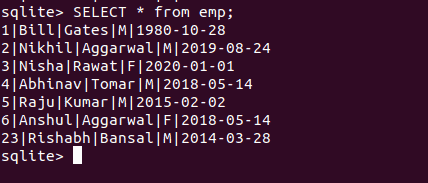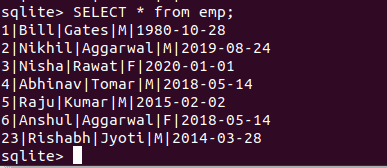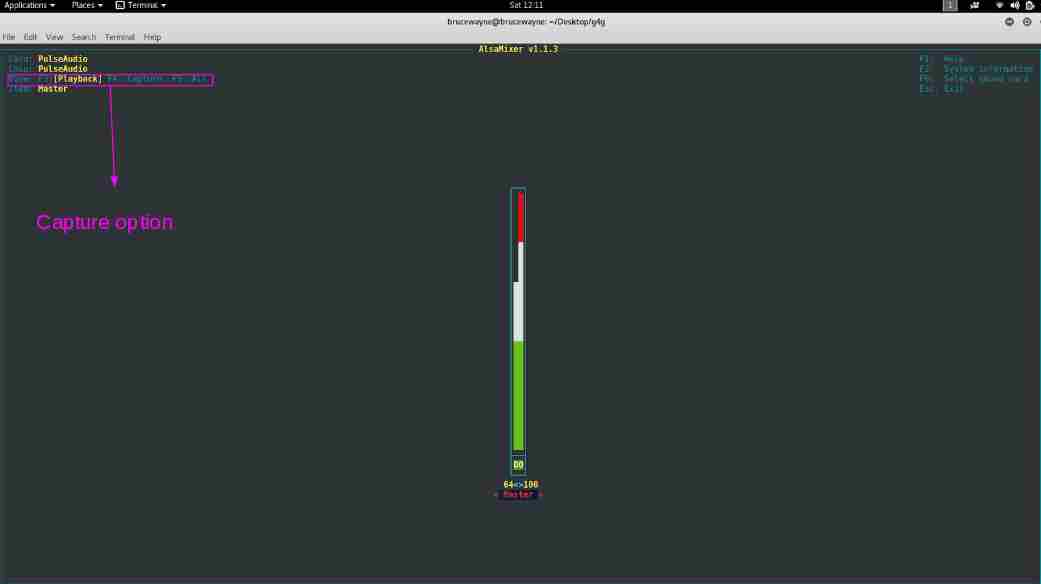本文讨论了SQLite3与Python的集成。这里我们将使用Python讨论SQLite3数据库上的所有CRUD操作。CRUD包含四项主要操作:

注: 这需要基本了解 SQL .
在这里,我们将用Python连接SQLite。Python有一个用于SQLite3的本机库,名为 sqlite3 .让我们解释一下它是如何工作的。
连接到SQLite数据库
- 要使用SQLite,我们必须导入 sqlite3 .
import sqlite3
- 然后使用 连接() 方法并传递要访问的数据库的名称。如果有具有该名称的文件,它将打开该文件。否则,Python将创建一个具有给定名称的文件。
sqliteConnection = sqlite3.connect('gfg.db')
- 在此之后,将调用游标对象,以便能够向SQL发送命令。
cursor = sqliteConnection.cursor()
示例:使用Python连接到SQLite3数据库
Python3
import sqlite3 # connecting to the database connection = sqlite3.connect( "gfg.db" ) # cursor crsr = connection.cursor() # print statement will execute if there # are no errors print ( "Connected to the database" ) # close the connection connection.close() |
输出:
Connected to the database
光标对象
在进一步讨论SQLite3和Python之前,让我们先讨论一下 光标对象 简言之
- 游标对象用于建立用于执行SQL查询的连接。
- 它充当SQLite数据库连接和SQL查询之间的中间件。它是在连接到SQLite数据库后创建的。
- 游标是一种控制结构,用于遍历和获取数据库的记录。
- 所有命令将仅使用游标对象执行。
执行SQLite3查询–创建表
在连接到数据库并创建游标对象之后,让我们看看如何执行查询。
- 要在数据库中执行查询,请创建一个对象,并在其中编写带有注释的SQL命令。示例:-sql_comm=“sql语句”
- 执行命令非常容易。调用游标方法execute(),并将sql命令的名称作为参数传递给它。将大量命令另存为sql_comm并执行它们。执行所有活动后,通过提交这些更改来保存文件中的更改,然后断开连接。
示例:使用Python创建SQLite3表
在本例中,我们将 使用Python创建SQLite3表 .标准SQL命令将用于创建表。
python
import sqlite3 # connecting to the database connection = sqlite3.connect( "gfg.db" ) # cursor crsr = connection.cursor() # SQL command to create a table in the database sql_command = """CREATE TABLE emp ( staff_number INTEGER PRIMARY KEY, fname VARCHAR(20), lname VARCHAR(30), gender CHAR(1), joining DATE);""" # execute the statement crsr.execute(sql_command) # close the connection connection.close() |
输出:

插入表格
到 插入数据 我们将再次将SQL命令作为字符串写入表中,并使用execute()方法。
示例1:使用Python将数据插入SQLite3表
Python3
# Python code to demonstrate table creation and # insertions with SQL # importing module import sqlite3 # connecting to the database connection = sqlite3.connect( "gfg.db" ) # cursor crsr = connection.cursor() # SQL command to insert the data in the table sql_command = """INSERT INTO emp VALUES (23, "Rishabh", "Bansal", "M", "2014-03-28");""" crsr.execute(sql_command) # another SQL command to insert the data in the table sql_command = """INSERT INTO emp VALUES (1, "Bill", "Gates", "M", "1980-10-28");""" crsr.execute(sql_command) # To save the changes in the files. Never skip this. # If we skip this, nothing will be saved in the database. connection.commit() # close the connection connection.close() |
输出:

示例2:插入用户输入的数据
Python3
# importing module import sqlite3 # connecting to the database connection = sqlite3.connect( "gfg.db" ) # cursor crsr = connection.cursor() # primary key pk = [ 2 , 3 , 4 , 5 , 6 ] # Enter 5 students first names f_name = [ 'Nikhil' , 'Nisha' , 'Abhinav' , 'Raju' , 'Anshul' ] # Enter 5 students last names l_name = [ 'Aggarwal' , 'Rawat' , 'Tomar' , 'Kumar' , 'Aggarwal' ] # Enter their gender respectively gender = [ 'M' , 'F' , 'M' , 'M' , 'F' ] # Enter their jpining data respectively date = [ '2019-08-24' , '2020-01-01' , '2018-05-14' , '2015-02-02' , '2018-05-14' ] for i in range ( 5 ): # This is the q-mark style: crsr.execute(f 'INSERT INTO emp VALUES ({pk[i]}, "{f_name[i]}", "{l_name[i]}", "{gender[i]}", "{date[i]}")' ) # To save the changes in the files. Never skip this. # If we skip this, nothing will be saved in the database. connection.commit() # close the connection connection.close() |
输出:

获取数据
在本节中,我们讨论了如何创建表以及如何在数据库中添加新行。 获取数据 从记录中插入数据很简单。execute方法使用SQL命令,使用“Select*from table_name”从表中获取所有数据,所有表数据都可以以列表的形式在对象中获取。
示例:使用Python从sqlite3表读取数据
python
# importing the module import sqlite3 # connect withe the myTable database connection = sqlite3.connect( "gfg.db" ) # cursor object crsr = connection.cursor() # execute the command to fetch all the data from the table emp crsr.execute( "SELECT * FROM emp" ) # store all the fetched data in the ans variable ans = crsr.fetchall() # Since we have already selected all the data entries # using the "SELECT *" SQL command and stored them in # the ans variable, all we need to do now is to print # out the ans variable for i in ans: print (i) |
输出:

注: 需要注意的是,将要创建的数据库文件将与python文件位于同一文件夹中。如果要更改文件的路径,请在打开文件时更改路径。
更新数据
对于 更新数据 在SQLite3表中,我们将使用UPDATE语句。我们可以根据需要使用update语句更新单列和多列。
UPDATE table_name SET column1 = value1, column2 = value2,… WHERE condition;
在上述语法中,SET语句用于为特定列设置新值,WHERE子句用于选择需要更新列的行。
示例:使用Python更新SQLite3表
Python3
# Import module import sqlite3 # Connecting to sqlite conn = sqlite3.connect( 'gfg.db' ) # Creating a cursor object using # the cursor() method cursor = conn.cursor() # Updating cursor.execute( '''UPDATE emp SET lname = "Jyoti" WHERE fname="Rishabh";''' ) # Commit your changes in the database conn.commit() # Closing the connection conn.close() |
输出:

删除数据
对于 删除数据 从SQLite3表中,我们可以使用delete命令。
DELETE FROM table_name [WHERE Clause]
示例:使用Python从SQLite3表中删除
Python3
# Import module import sqlite3 # Connecting to sqlite conn = sqlite3.connect( 'gfg.db' ) # Creating a cursor object using # the cursor() method cursor = conn.cursor() # Updating cursor.execute( '''DELETE FROM emp WHERE fname="Rishabh";''' ) # Commit your changes in the database conn.commit() # Closing the connection conn.close() |
输出:

删除表
DROP用于删除整个数据库或表。它删除了表中的两条记录以及表结构。
语法:
DROP TABLE TABLE_NAME;
示例:使用Python删除SQLite3表
gfg中的总表格。下降前的db

现在让我们删除学生表,然后再次检查数据库中的total表。
Python3
# Import module import sqlite3 # Connecting to sqlite conn = sqlite3.connect( 'gfg.db' ) # Creating a cursor object using # the cursor() method cursor = conn.cursor() # Updating cursor.execute( '''DROP TABLE Student;''' ) # Commit your changes in the database conn.commit() # Closing the connection conn.close() |
输出:

注: 要了解有关SQLit3与Python的更多信息,请参阅我们的 Python SQLite3 辅导的
本文由 里沙布·班萨尔 .如果你喜欢GeekSforgek,并想贡献自己的力量,你也可以使用 写极客。组织 或者把你的文章寄去评论-team@geeksforgeeks.org.看到你的文章出现在Geeksforgeks主页上,并帮助其他极客。
如果您发现任何不正确的地方,或者您想分享有关上述主题的更多信息,请写下评论。


![关于”PostgreSQL错误:关系[表]不存在“问题的原因和解决方案-yiteyi-C++库](https://www.yiteyi.com/wp-content/themes/zibll/img/thumbnail.svg)





